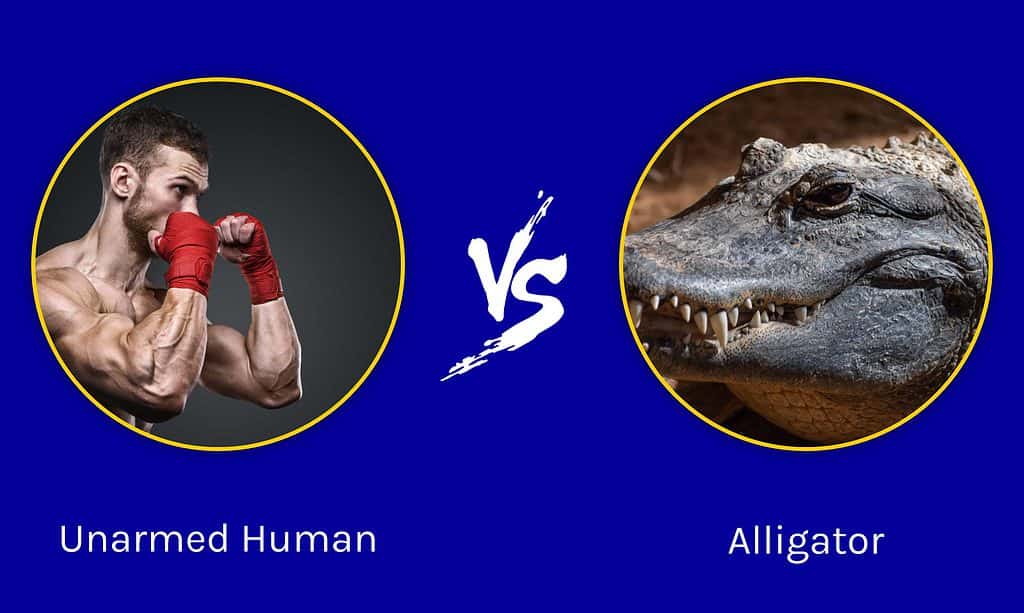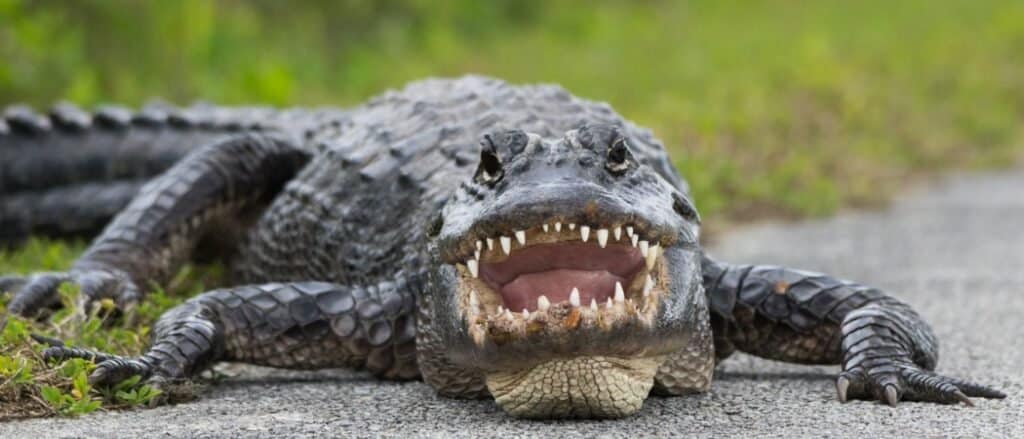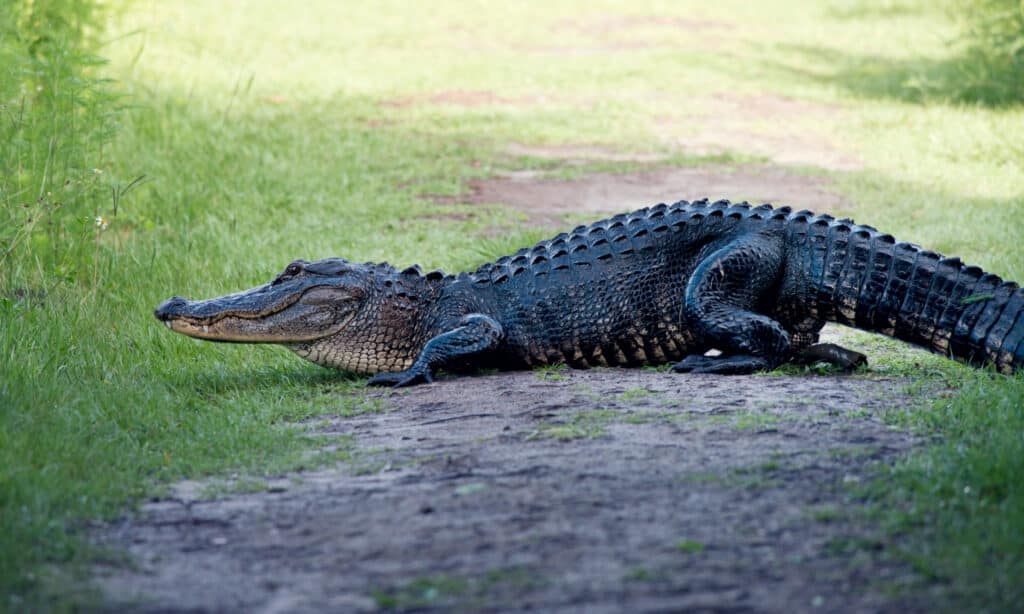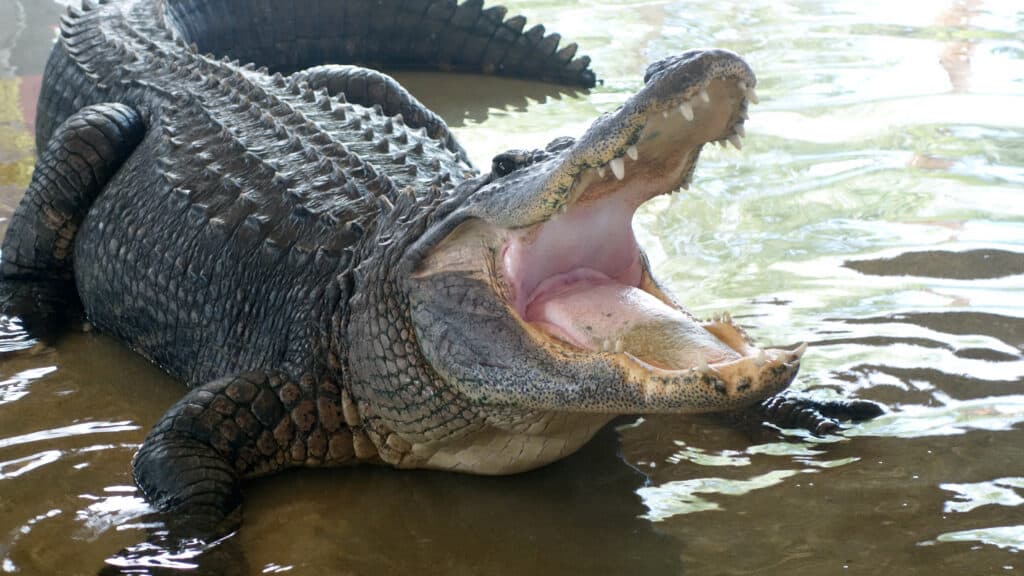Humans are great creators and innovators. However, when we lack our tools and weapons, we’re far from the strongest beings on the planet. Alligators are vicious reptiles that regularly hunt various creatures in their range. They’re not always primed to kill humans, but alligators and people do run afoul of each other. Today, we’re going to ask, would an unarmed human beat an alligator in a fair fight?
We’ll take a look at the parts of this fight and determine if a person has a chance against a gator if they don’t have some sort of weapon handy. For our purposes, we will use the measures for the American alligator so that the fight is fair.
Comparing an Unarmed Human and an Alligator

| Unarmed Human | Alligator | |
|---|---|---|
| Size | Weight: between 130 and 200 pounds, with higher weights possible Height: from 5 feet 3 inches up to 5 feet 9 inches tall | Weight: from 400 to 800 pounds Height: 1 to 2 feet Length: from 8.2 feet to 11.2 feet |
| Speed | – Typical running speed is between 6.5 and 8 mph – Maximum human speed is over 27 mph, but only amid a sprint by the fastest human | – Typically, they are rather slow on land, up to 10 mph for short distances – Can use small bursts of speed to reach over 20 mph when attacking |
| Defenses | – Relatively weak physical defenses – Amazing intellect allows humans to overcome adverse situations | – Thick skin reinforced with scutes – Can camouflage in water and vegetation – Their speed allows them to get from land to water and move to safety |
| Offensive Capabilities | – Weak bite force of less than 200 PSI – Small teeth – Limited strength relative to other animals – Can use many sorts of strikes to attack | – Bite power of roughly 2,980 PSI at its utmost – Has teeth that measure about 1 inch in length on average – Some teeth can reach 2.5 inches long – 80 conical teeth made for grabbing and puncturing prey’s flesh and organs |
| Predatory Behavior | – Usually relies on weapons or traps to attack – May try to use ambush tactics – Unarmed, the human must rely on an ambush to be successful in a fight against bigger animals | – Ambush predator – Tries to kill prey with a bite and death roll |
What Are the Key Factors in a Fight Between an Unarmed Human and an Alligator?
Determining the winner of a battle between an unarmed human and an alligator requires examining several elements.
We can’t just look at the human intellect or the alligator’s power. Instead, we will focus on five key factors in the battle. The factors include predatory behavior, size, defenses, speed, and offensive prowess. By comparing each animal’s stats in these categories, we can determine the fight’s winner.
Unarmed Human vs. Alligator: Size

The alligator is larger than the average human.
©iStock.com/tobiasfrei
Alligators are larger than humans on average. The average American alligator weighs between 400 and 800 pounds, stands about 1 to 2 feet tall, and grows between 8 and 15 feet long. They can get larger, though.
Meanwhile, the average human only weighs between 120 and 200 pounds, standing about 5 feet 9 inches on average for males, with taller individuals also possible.
Any way we slice it, alligators are larger in every dimension except height, so they have the advantage.
Unarmed Human vs. Alligator: Speed

Humans are faster on land than alligators.
©restyler/Shutterstock.com
Alligators are faster than humans over very short distances, but humans have more stamina and the ability to run longer distances. An alligator can burst forth from the water and scamper at roughly 20 mph. Again, this is for very short distances, but it’s often enough to snag prey.
Humans can run at speeds between 6 and 8 mph on average, but they can also hit much higher speeds, over 20 mph. Still, the vast majority of humans will never hit anywhere around 20 mph in running speed. Outside of that initial burst, humans can run faster and longer than alligators on land but cannot match their speed in the water.
All in all, the fastest human is faster than the alligator on land.
Unarmed Human vs. Alligator: Defenses

The tough skin of alligators serves as their defense.
©Svetlana Foote/Shutterstock.com
Alligators have great defenses. They have thick, tough skin that is reinforced with scutes on the back. They can hide well in vegetation as well as beneath the water. Their prey will scarcely know of their presence before they’re bitten in many cases.
Meanwhile, humans are not that strong defensively. Since human bodies are somewhat frail, they must rely on their brains to keep them safe. They can try to use the environment to their favor, outrun their prey, and use sensory input to warn them of danger. Yet, it doesn’t take much to seriously injure or kill a person.
Alligators have better defenses.
Unarmed Human vs. Alligator: Offensive Capabilities
Humans do not have much in the way of offensive capabilities. We can use blunt force to beat other animals. Otherwise, we can use our arms and legs to grapple and choke animals. Our teeth are small, and our bite force is weak. Still, we can muster a fight against many different creatures and other humans using our physical force and ability to think.
Alligators have vast offensive powers. The average gator can bite with a force of about 2,980 PSI, more than enough to crack bones, puncture organs, and do severe damage. Moreover, their teeth can reach about 2.5 inches in length, and they’re built to grab prey. When a gator bites someone, they begin to roll over and over, disorienting the prey and sometimes amputating whatever part of the body they’re attached to.
Alligators have a significant offensive advantage.
Unarmed Human vs. Alligator: Predatory Behavior
Humans with tools are the apex predators of this planet. Unarmed, though, we rely on stealth and surprise attacks to use our limited offensive toolkit with effectiveness.
Alligators are ambush predators. They wait at the edge of a body of water for something to enter the water, like a deer bending over to drink. Once the water is disturbed, the alligator bursts out of its cover, grabs the prey, and begins biting and shredding the animal.
As you may guess, alligators have the predatory advantage in this bout.
Who Would Win in a Fight Between an Unarmed Human and an Alligator?

Unarmed humans cannot stand an alligator in a fight.
©Ernie Hounshell/Shutterstock.com
An unarmed human can not beat an alligator in a fight. Now, some people may ask, “what if the human rolls the alligator on its stomach?” Even in that case, humans lack the power to kill a fully grown alligator. Without so much as a rock, the human won’t be able to bludgeon, bite, or strangle the gator to death.
Eventually, that gator is going to land a bite on the person, and that individual will perish. If the fight starts at the edge of a swamp or a body of water, the human is probably going to get dragged into the water, bitten, and drowned.
On even land, the alligator probably won’t know what to do in the situation until the human gets close. Once the alligator senses that it’s in danger, it’s going to react by biting the person. The long and short of this battle is that a human can’t do anything to the alligator without getting close enough that the larger, stronger, more well-armed animal lands a strike. That single bite is all it would take to break a human’s leg, tear open their arm, or grab their head or neck and kill them in a few moments.
It should go without saying, but make sure you leave alligators alone if you encounter them in the wild. They will severely harm you.
Up Next:
- Could an Unarmed Human Beat a Crocodile?
- Could an Unarmed Human Beat a Rabid Goose?
- Could an Unarmed Human Beat a Grizzly Bear?
- Could an Unarmed Human Beat an Elephant?
The photo featured at the top of this post is © iStock.com/Maryna Rayimova
Thank you for reading! Have some feedback for us? Contact the AZ Animals editorial team.






